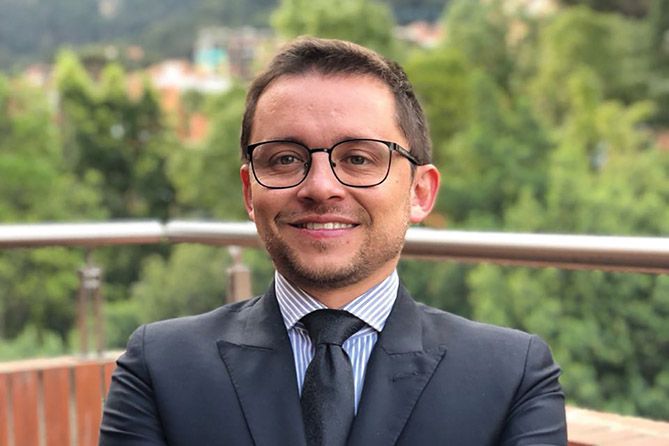Andrés López is a chemist who started to work in the national narcotics office (FNE) of the Colombian Ministry of Health in 2007. He joined the drug policy office in the Ministry of Justice in 2013.
In December of that year, López developed a major interest in cannabis regulation. He attended an intergovernmental meeting in Bogota, where the heads of drug agencies across the Americas discussed how they could team up to combat drug trafficking.
Coincidentally, the meeting occurred the same year Uruguay became the first country to fully legalize cannabis—a hot topic among the attendees. After the meeting, López started developing proposals and technical documents to support a Colombian cannabis law that was being drafted to legalize cannabis for medical and scientific purposes.
In mid-2016, when Colombian Law 1787 was approved, López returned to the FNE as general director to oversee the implementation of the cannabis law. He stayed at the agency until mid-2019. López shared some of his experiences with Marijuana Business Magazine.
What’s the status of CBD in Colombia, and how does it relate to the World Health Organization’s (WHO) cannabis scheduling recommendations?
In Colombia, even before the cannabis law, it was clear that CBD is not a narcotic drug. The FNE has been allowing imports and exports for years.
But THC is a narcotic. The lack of standards regarding THC traces in CBD medicines is what the WHO is proposing to solve with an international THC threshold. If the recommendation is approved, it would eliminate a barrier of access to medical CBD products while allowing drug-enforcement authorities to focus on more dangerous drugs—of which there are plenty.
Unfortunately, drug policymaking has been historically based in good intentions but also a lack of evidence. The current scheduling status of cannabis and cannabis products is the best proof, and change at a multinational level is extremely challenging and slow.
In this scenario, I think countries should focus on taking a step ahead on national levels. They should set their own THC limits to define narcotics in favor of patients and based on science.
What has been the social impact of medical legalization in Colombia?
The Colombian cannabis law is based on the constitutional right to health, and the purpose is to provide safe access to medicinal cannabis. Of course, it also creates a new industry with opportunities for economic development and revenue.
At the very beginning, the industry was seen more as a new agriculture business rather than a pharmaceutical operation. Now, with regulations in some of the more promising markets like Brazil and Germany being quite restrictive in terms of quality standards, it’s clear that significant investment should be made to develop such capacities. But it won’t be easy for small growers to afford to comply with such regulations.
Companies that have already made such investments are employing a lot of local workers in their operations, providing formal employment—usually with gender inclusion.
Significant employment was also generated around licensing in Colombia. This includes service providers of legal, agronomic and technical consultancy that in many cases help the smaller companies get up and running.
Which foreign cannabis regulations were considered for the Colombian regulatory model?
At the end of 2014, I joined Sen. Juan Manuel Galan—the future author of the Colombian cannabis law—and some other lawmakers in a visit to Colorado. There, we had a rich exchange of experiences with lawmakers, licensed producers, dispensaries and patients.
Experts from Colorado provided valuable insights about the main mistakes and related amendments to their regulations.
Also, Uruguay was an interesting source of ideas—particularly regarding the separation of high-THC and low-THC cannabis regulations—to make a policy based in risk assessment.
We also learned from countries like Germany, where the use of magistral preparations as a high-quality alternative to registered medicines is key. Also, like in Germany, we didn’t want to write a list of qualifying medical conditions, which might be restrictive and hard to update. We preferred to leave the decision to the doctors.
The interview has been edited for length and clarity.





